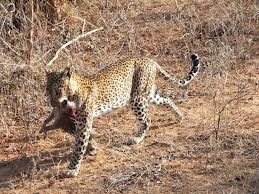 For more than a century, Yala National Park in Sri Lanka has been one of Asia’s most celebrated wildlife preserves, a lush windswept tropical forest rich in rare aquatic birds and abundant with ferocious predators, such as crocodiles and sloth bears. But only very recent years has Yala’s big cat distinction beer brought to light. It contains one of the world’s largest concentration of leopards.
For more than a century, Yala National Park in Sri Lanka has been one of Asia’s most celebrated wildlife preserves, a lush windswept tropical forest rich in rare aquatic birds and abundant with ferocious predators, such as crocodiles and sloth bears. But only very recent years has Yala’s big cat distinction beer brought to light. It contains one of the world’s largest concentration of leopards.Yala park lies along the semi arid south-easetrn coast and is Sri Lanka’s most popular leopard park. Divided in to five blocks the park routinely receives day visitors in to block one, and other blocks by special permission. The official estimate for the island’s leopard population hovers between 700 and 1000 individuals while a more precise estimate available for Block One count just twenty breeding adult plus their cubs, on average, two two cubs per litter; however take into account that only about fifty percent of the cubs survive.
Central Province leopards
Central Province leopards are used to a cooler, wetter climate than in yala and also have a different diet.
Yala leopards eat mostly axis deer, wild boar, buffalo and sambhur-deer whereas Central Province leopards feed essentially on barking- deer, porcupine and wild boar, while higher up in the mountains sambhur -deer becomes their main staple.
Ranging routes for both groups are not specifically known though terrain hypothetically allows Central Province leopards to travel south from around Kandy to reach the peak’s wildlife sanctuary while Yala leopards have the possibility to some degree to travel northward.
Forests on mountain summits is often broken up in patches by tea plantations and home garden agriculture areas which leopards nonetheless cross to reach other forested zones.
Successful use of cultivated terrain is a testimony to the cat’s adaptation and stealth. There are a few human victims resulting from the proximity between leopard and man, and in seven or eight years, only two incidents near the Horton Plains were reported.





